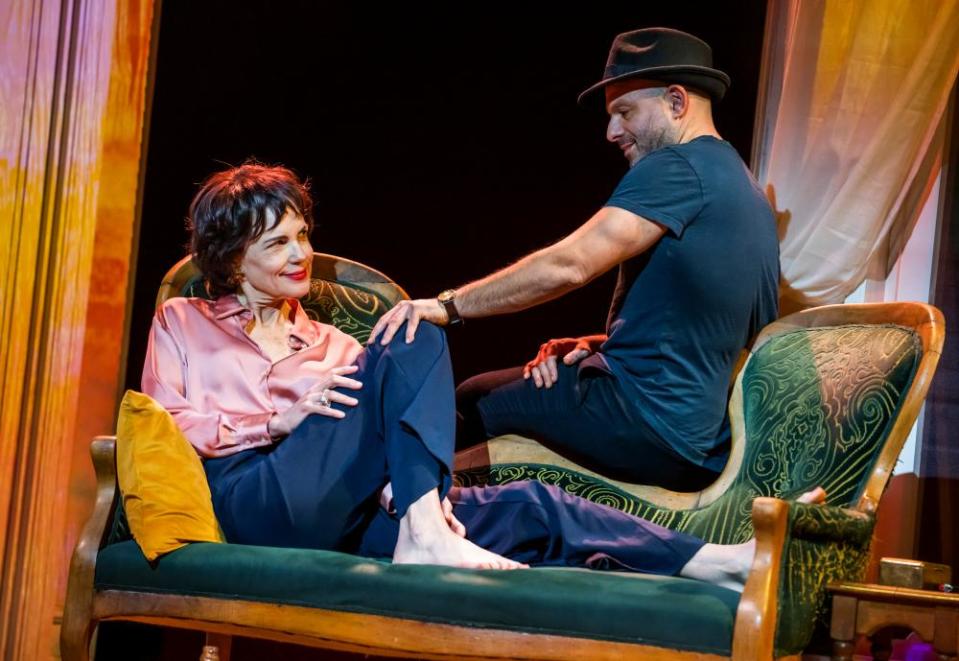The week in theatre: Dr Semmelweis; Ava: The Secret Conversations – review
Bristol Old Vic; Riverside Studios, London
Mark Rylance mines more drama from the 19th-century doctor driven mad by his work on hygiene than Elizabeth McGovern finds in the faded glamour of Ava Gardner
From now on I’ll find it hard to wash my hands without thinking of Mark Rylance. In Dr Semmelweis he incarnates the Hungarian doctor who was a pioneer of antisepsis but is now largely forgotten. Perplexed, furious and zealous, Rylance is the burning centre of the play he wrote with Stephen Brown before the pandemic, and which is now brought to reverberating life under the direction of Tom Morris.
Working in the obstetric clinic of the Vienna general hospital in the mid-19th century, Ignaz Semmelweis was appalled by the number of women who were dying soon after giving birth. Conventional medicine considered the deaths inevitable, accounting for them by miasma, poor ventilation or emotional disturbance. Semmelweis’s investigations, conducted before the concept of bacteria, revealed that patients were being unintentionally harmed by the men who were trying to heal them: physicians, who moved straight from conducting autopsies to delivering babies, were contaminating the mothers. When they washed their hands with a chlorinated solution, the deaths ceased. The effect was indisputable but resisted by the medical profession for years; Semmelweis died, his work unacknowledged, in an asylum.
The medical history is crystal clear, but this is also a murky individual story. In the way of whistleblowers, Semmelweis was tremendously difficult. Not simply awkward but ruthless, blinkered, dragged by vision and mission. Rylance is wonderful at conveying the sense of being out of control, unstable with passion. His eyes are often fixed, but his words come out in flurries; he seems to interrupt himself, as if head-butted by his own sentences. The human cost of his obsession, in which individuals are sacrificed for the general good, is made painfully apparent in very fine performances by Thalissa Teixeira as his wounded, distinguished wife, and Jackie Clune, the intelligent nurse to whom no one attends because she is – well – just a nurse.
Related: Mark Rylance: ‘Theatre is a thousand times more enjoyable than film’
Morris directs with high imagination, weaving together naturalism and dream. Ti Green’s design encloses the action in an iron rotunda: unyielding, inescapable (though Rylance twice shins up its tall pillars). Voiceless women, dead mothers, soft-limbed in russet and pirouetting in tulle, dance through the evening. Violinists (all female) move among the audience and actors, playing Schubert’s Death and the Maiden. These are more than spectral victims. They are reminders that the line between delusion and original insight is not firm; that not everybody sees everything; that phenomena as yet unnamed and unexplained – hello, 19th-century bacteria – are not necessarily fictions.
Elizabeth McGovern has also written a play with herself in the title role. Ava: The Secret Conversations is the story of a star, but as drama it is more of a black hole. Based on Ava Gardner’s autobiography, written with Peter Evans, Gaby Dellal’s production trots dutifully through the actor’s life, viewed from the perspective of her final years, when, having had a stroke and settled in London, she was being interviewed by Evans, played by Anatol Yusef.

Videos designed by Matthew Taylor – rather too sumptuous for a play that aims at intimacy – act like tourist-board ads when the scene shifts: London is St Paul’s and a downpour of rain, though Gardner actually lived on the other side of town. The two actors often remind each other of who they are: “Peter, can I ask you a question?” “Yes, Ava.” The fairly well-rehearsed facts of Gardner’s life – with husbands Mickey Rooney, Artie Shaw and Frank Sinatra – enable McGovern to be barefoot and foul-mouthed, but also kittenish, and Yusef to supply some routine gestures towards impersonation (Sinatra is slurred in a trilby). The off-stage voice of Ed Victor, wheeler-dealer literary agent, is heard demanding his client get details of Sinatra’s penis: not fair to Victor, this – he certainly wasn’t delicate, but he was too clever to be that crass.
McGovern flickeringly suggests how beguilingly she might summon up Gardner, but she is very low-wattage. Why? Because of the stroke (one hand is crooked to her chest)? Because her spirits are waning with her fame? Or because she is stunned by the script she has given herself? She deserves better.
Star ratings (out of five)
Dr Semmelweis ★★★★
Ava ★★
Dr Semmelweis is at Bristol Old Vic until 19 February
Ava: The Secret Conversations is at the Riverside Studios, London, until 16 April


